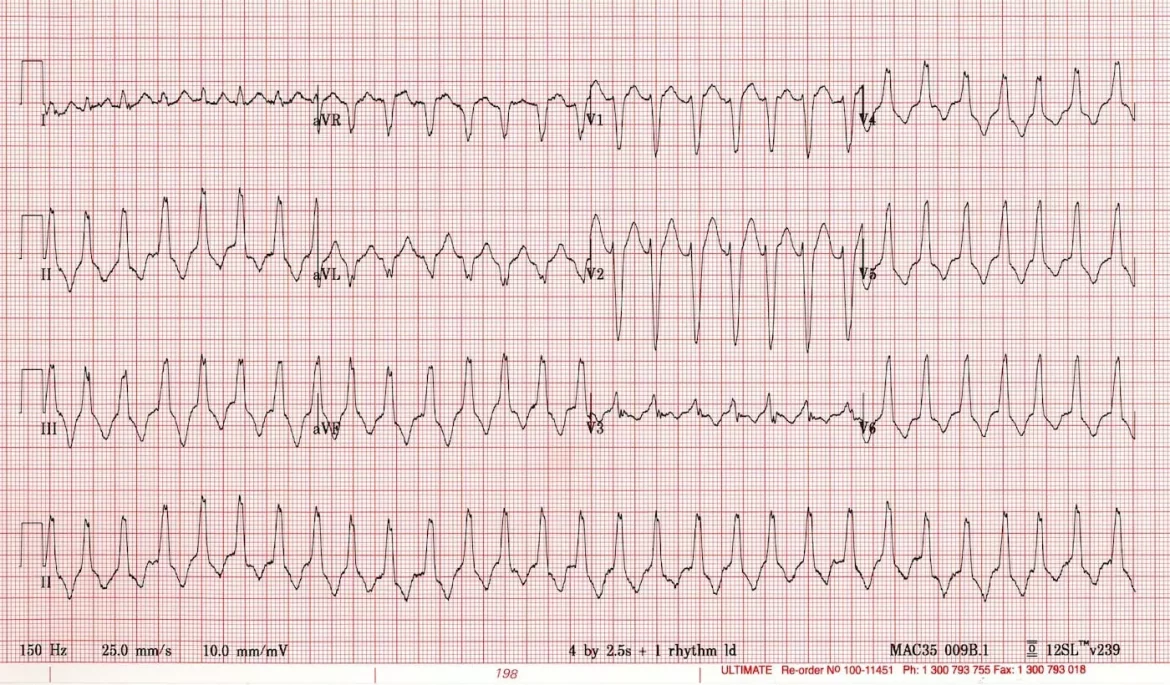Wide QRS complex is a term used in cardiology to describe a specific pattern seen on an electrocardiogram (ECG). This pattern is characterized by a QRS duration that exceeds 120 milliseconds, indicating an abnormality in the electrical conduction system of the heart. Understanding the symptoms associated with a wide QRS complex is crucial for early diagnosis and management of underlying cardiac conditions. This article explores the various symptoms of wide QRS, their implications, and the importance of timely medical intervention.
What Is The QRS Complex?
Before delving into the symptoms of a wide QRS complex, it’s essential to understand what the QRS complex represents.
The QRS complex is a vital part of the ECG, reflecting the depolarization of the ventricles—the lower chambers of the heart.
This process is critical for the heart’s ability to pump blood effectively. In a healthy heart, the QRS complex is narrow, indicating normal electrical conduction through the ventricles.
What Causes A Wide QRS Complex?
A wide QRS complex can result from various conditions that disrupt the normal conduction pathways in the heart. Some common causes include:
Bundle Branch Block (BBB): A delay or blockage in the electrical impulses traveling through the right or left bundle branches can widen the QRS complex.
Ventricular Tachycardia (VT): A fast heart rhythm originating from the ventricles can cause a wide QRS complex.
Hyperkalemia: Elevated potassium levels in the blood can affect the heart’s electrical activity, leading to a wide QRS complex.
Pre-excitation Syndromes: Conditions like Wolff-Parkinson-White (WPW) syndrome, where an extra electrical pathway in the heart causes abnormal conduction.
Medications: Certain drugs, such as antiarrhythmics and tricyclic antidepressants, can affect the QRS duration.
What Are The Symptoms of Wide QRS?
General Symptoms
The symptoms associated with a wide QRS complex can vary depending on the underlying cause and the severity of the condition.
Common symptoms include:
Palpitations: Patients may experience an awareness of their heartbeat, which can feel fast, irregular, or pounding.
Dizziness or Lightheadedness: Due to inefficient pumping of blood, patients might feel dizzy or lightheaded, particularly during physical exertion.
Shortness of Breath: Difficulty in breathing or feeling short of breath can occur, especially during activities that require exertion.
Fatigue: Generalized fatigue and weakness are common, as the heart’s reduced efficiency affects overall energy levels.
Chest Pain: Some patients may experience chest discomfort or pain, which can be a sign of decreased blood flow to the heart muscle.
See Also: 4 Kinds Of Healthy Cooking Oil Good For Hypertension
Symptoms Specific to Underlying Conditions
The symptoms of a wide QRS complex can also be specific to the underlying cardiac condition causing the abnormality:
1. Bundle Branch Block (BBB)
Right Bundle Branch Block (RBBB): Often asymptomatic but can present with palpitations, syncope, or pre-syncope.
Left Bundle Branch Block (LBBB): May cause dyspnea, fatigue, and palpitations. In some cases, LBBB is associated with underlying heart disease and may worsen symptoms of heart failure.
2. Ventricular Tachycardia (VT)
Sustained VT: Can lead to severe symptoms such as syncope, sudden cardiac arrest, and hemodynamic instability. Patients often feel rapid, pounding heartbeats.
Non-sustained VT: May cause palpitations, lightheadedness, and occasionally syncope.
3. Hyperkalemia
Mild to Moderate Hyperkalemia: Symptoms can include muscle weakness, fatigue, and palpitations. ECG changes, including wide QRS complexes, are a key diagnostic feature.
Severe Hyperkalemia: Can lead to life-threatening arrhythmias, profound muscle weakness, and even paralysis.
4. Pre-excitation Syndromes
Wolff-Parkinson-White (WPW) Syndrome: Symptoms can include palpitations, dizziness, syncope, and episodes of rapid heart rate (tachycardia). WPW syndrome can lead to atrial fibrillation with a wide QRS complex.
5. Medications
Antiarrhythmic Drugs: Can cause proarrhythmia, leading to wide QRS complexes and symptoms like dizziness, palpitations, and syncope.
Tricyclic Antidepressants: Overdose can result in cardiac toxicity, presenting with wide QRS complexes, seizures, and altered mental status.
See Also: Which Milk Is Good For High Blood Pressure?
Diagnostic Approach
Diagnosing the cause of a wide QRS complex involves a comprehensive approach, including:
Detailed Medical History: Understanding the patient’s symptoms, medical history, and medication use.
Physical Examination: Assessing vital signs, heart sounds, and signs of heart failure or other systemic conditions.
Electrocardiogram (ECG): The primary tool for identifying a wide QRS complex and associated arrhythmias.
Blood Tests: Measuring electrolyte levels, especially potassium, and assessing for markers of cardiac injury.
Imaging Studies: Echocardiography or cardiac MRI to evaluate structural heart disease.
Electrophysiological Studies: Invasive testing to pinpoint the exact nature of electrical abnormalities.
Management And Treatment
The treatment of a wide QRS complex focuses on addressing the underlying cause and preventing complications. Treatment options may include:
Medications: Antiarrhythmic drugs, beta-blockers, or calcium channel blockers to control heart rate and rhythm. Potassium-lowering agents in cases of hyperkalemia.
Lifestyle Modifications: Dietary changes, exercise, and weight management to improve overall heart health.
Device Therapy: Pacemakers or implantable cardioverter-defibrillators (ICDs) for patients with significant conduction abnormalities or at risk of sudden cardiac arrest.
Catheter Ablation: A procedure to eliminate abnormal electrical pathways in conditions like WPW syndrome or recurrent VT.
Surgery: In some cases, surgical interventions may be necessary to correct structural heart defects.
Prognosis
The prognosis for individuals with a wide QRS complex varies widely based on the underlying cause and the effectiveness of treatment.
Early diagnosis and appropriate management are critical for improving outcomes. Patients with conditions like bundle branch block or mild hyperkalemia may have a favorable prognosis with minimal intervention, while those with severe VT or hyperkalemia require urgent treatment to prevent life-threatening complications.
Conclusion
A wide QRS complex is a significant finding on an ECG that warrants careful evaluation and management. The symptoms can range from mild palpitations and fatigue to severe dizziness, syncope, and chest pain, depending on the underlying cause. Early recognition and treatment are essential to mitigate the risks associated with wide QRS complexes and improve patient outcomes. If you experience any symptoms suggestive of a wide QRS complex, seek medical attention promptly to ensure appropriate care and management.

